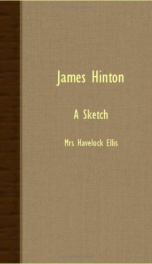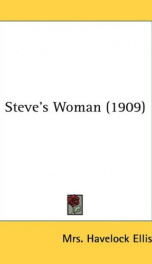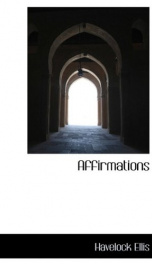james hinton a sketch

JAMES HINTON - PREFACE - THE name of James Hinton is unfamiliar to the generation of to-day. Yet he was a man of passionately vivid and eager temperament, whose hands could not fail to leave the distinct impress of that temperament on any subject he touched. At the beginning of his career he wrote a book, Man and his Dwelling Place, which has little interest for us to-day, but made a considerable appeal to the thinkers of Hintons own generation later he wrote a popular yet highly original book of biological character, Life in Nature, which still seems to me the most satisfactory of his books he further accomplished good work in the special field of surgical practice to which he devoted himself, and as an aurist achieved complete professional success finally, during the last years of his life, he became absorbed in social and moral problems, more especially those connected with sex, and accumulated vast piles of manuscript which he never worked up for publication. It so happened that, as a youth, a few years after Hintons death, I chanced to read Lije in Nature, and the view of the natural world there presented, as at once scientifically explicable mechanism and a satisfyingly beautiful vision, greatly aided me in obtaining a harmonious conception of life and the Universe. I cannot say, however, that Hintons moral speculations, which I then knew nothing about, had any influence on my work in the field of sex that work was, indeed, very largely a reaction against premature speculation, an attempt to reach the solid facts by which all mere speculation must be tested and measured. But I became generally interested in Hinton. I obtained access to his unpublished papers, and I assisted Mrs. Hinton in selecting and editing some of them under the title of The Lawbreaker. Finally, it was Mrs. Hintons wish that I should ultimately put a complete presentation of his moral speculations before the world. With that end in view I read and extracted a large quantity of Hintons manuscript and collected the reminiscences of many of his friends. As years passed, however, I realised that the task I had undertaken presented many difficulties, while at the same time I became more occupied with the very different, and even to some extent incongruous, work of my own. Finally, I abandoned my project. Some tell years ago, my wife became interested in Hinton, and spontaneously proposed to take up the task I had abandoned. In this she received the approval and encouragement of Hintons son, the late C. Howard Hinton. I handed over to her the material I had collected and the notes I had made, and she proceeded to investigate Hintons manuscripts afresh and also obtained valuable aid from the more intimate of his few surviving friends. She has at intervals proceeded with this task ever since, hampered not only by some of the same difficulties I encountered, but also by a serious struggle with ill-health. The work has, however, remained entirely her own, and I have had nothing to do with either the planning or the writing of it. The final result, still imperfect as she would herself recognise, is here presented to the reader...
Info about the book
Author:
Series:
Unknown
ISBN:
1290150850
Rating:
3.5/5 (5)Your rating:
0/5
Languge:
English
Users who have this book
Users who want this book
What readers are saying
What do you think? Write your own comment on this book!
write a commentif you like james hinton a sketch try:
Other books by this author
Do you want to read a book that interests you? It’s EASY!
Create an account and send a request for reading to other users on the Webpage of the book!







